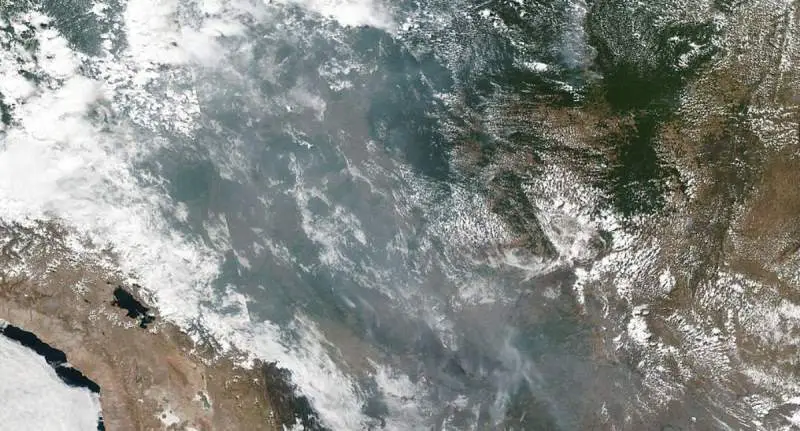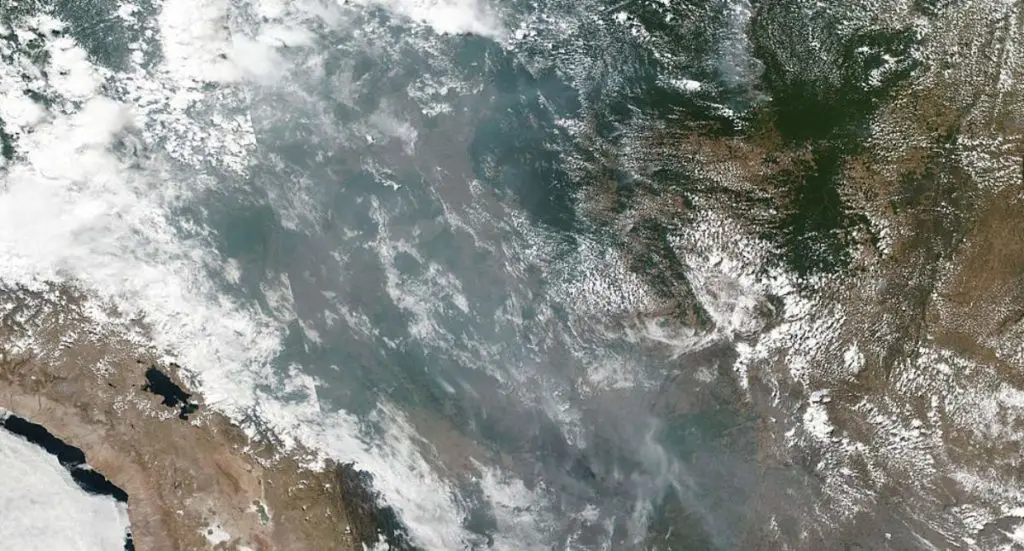As awareness of unprecedented wildfires hitting rainforests in the Brazilian Amazon spread online in August 2019, social media users began drawing links between the blazes and a court victory for an indigenous Ecuadorian tribe weeks earlier.
On July 11 2019, an Ecuadorian provincial court ruled in favor of the Waorani tribe against the country’s government, saying that officials did not have the right to sell rainforest territory to oil companies.
“This victory is for my ancestors. It’s for our forest and future generations,” said the plaintiff, Nemonte Nenquimo, who also heads the Waorani Pastaza Organization:
We have shown that life is more important than oil and that united we can protect our way of life, the Amazon rainforest, and our planet from destruction.
The ruling by the three-judge court protects a reported half a million acres of rainforest from being used for oil drilling.
However, while the cause behind them remains undetermined, the wildfires that have drawn gradually increasing media coverage and social media attention were burning in Brazil, thousands of miles away from Waorani territory. That is not to say that humans did not have a hand in starting the fires in Brazil. Environmentalists blame human activity and corrupt business interests enabled and emboldened by anti-conservationist president Jair Bolsonaro:
“The vast majority of these fires are human-lit,” said Christian Poirier, the program director of non-profit organization Amazon Watch. He added that even during dry seasons, the Amazon — a humid rainforest — doesn’t catch on fire easily, unlike the dry bushland in California or Australia.
Farmers and ranchers have long used fire to clear land, said Poirier, and are likely behind the unusually large number fires burning in the Amazon today.
The country’s space research center (INPE) said this week that the number of fires in Brazil are 80% higher than last year. More than half are in the Amazon region, spelling disaster for the local environment and ecology.
And 99% percent of the fires result from human actions “either on purpose or by accident,” Alberto Setzer, a senior scientist at INPE, said. The burning can range from a small-scale agricultural practice, to new deforestation for a mechanized and modern agribusiness project, Setzer told CNN by email.
The Amazon forest produces about 20% of the world’s oxygen, and is often called “the planet’s lungs.” According to the World Wildlife Fund, if it is irrevocably damaged, it could start emitting carbon instead — the major driver of climate change.
According to the Brazilian National Institute for Space Research (INPE) almost 36,000 fires in the country — including fires burning in the rainforest — ignited within a 30-day period. The damage of the fires was large enough to be visible from space:

Through the first eight months of 2019, INPE officials said, Brazil had reported 74,155 wildfires — an increase of more than 80 percent compared to 2018. However, the U.S.-based National Aeronautics and Space Administration (NASA) reported that fire activity as a whole around the Amazon basin was consistent with the average across the past 15 years.
The wildfires, have, however, drawn a round of criticism against Brazil’s far-right president; in July 2019, Bolsonaro accused INPE of releasing false data showing an increase in deforestation under his administration, leading to the firing of INPE head Ricardo Galvão. In response to the wildfires a month later, Bolsonaro has accused non-governmental organizations of setting them but has not offered any proof or even named specific organizations he believed to be behind them.
“There could be… I’m not affirming it, criminal action by these ‘NGOers’ to call attention against my person, against the government of Brazil,” Bolsonaro said during a broadcast on Facebook on August 22, 2019. “This is the war that we are facing.” He later admitted he had no evidence, and it was just a feeling. That same day, however, he admitted that his administration did not have the resources needed to properly fight the fires.
The news outlet Democracia Abierta also reported that, according to a leaked presentation, Bolsonaro’s unfounded accusations against NGOs were part of a strategy to fight what his administration considers a “globalist campaign” to prevent it from further carrying out deforestation plans.
Amazonia generates more than 20 percent of the world’s oxygen, and contributes to at least 10 percent of the planet’s known biodiversity.
- Ecuador Tribe Wins Legal Battle Over the Amazon
- Waorani People Win Historic Appeal Against Ecuadorian Government
- Tens Of Thousands Of Fires Ravage Brazilian Amazon, Where Deforestation Has Spiked
- Fires in Brazil
- Amazon Deforestation: Brazil's Bolsonaro Dismisses Data as 'Lies'
- Blame humans for starting the Amazon fires, environmentalists say
- Leaked Documents Show Brazil's Bolsonaro Has Grave Plans for Amazon Rainforest

